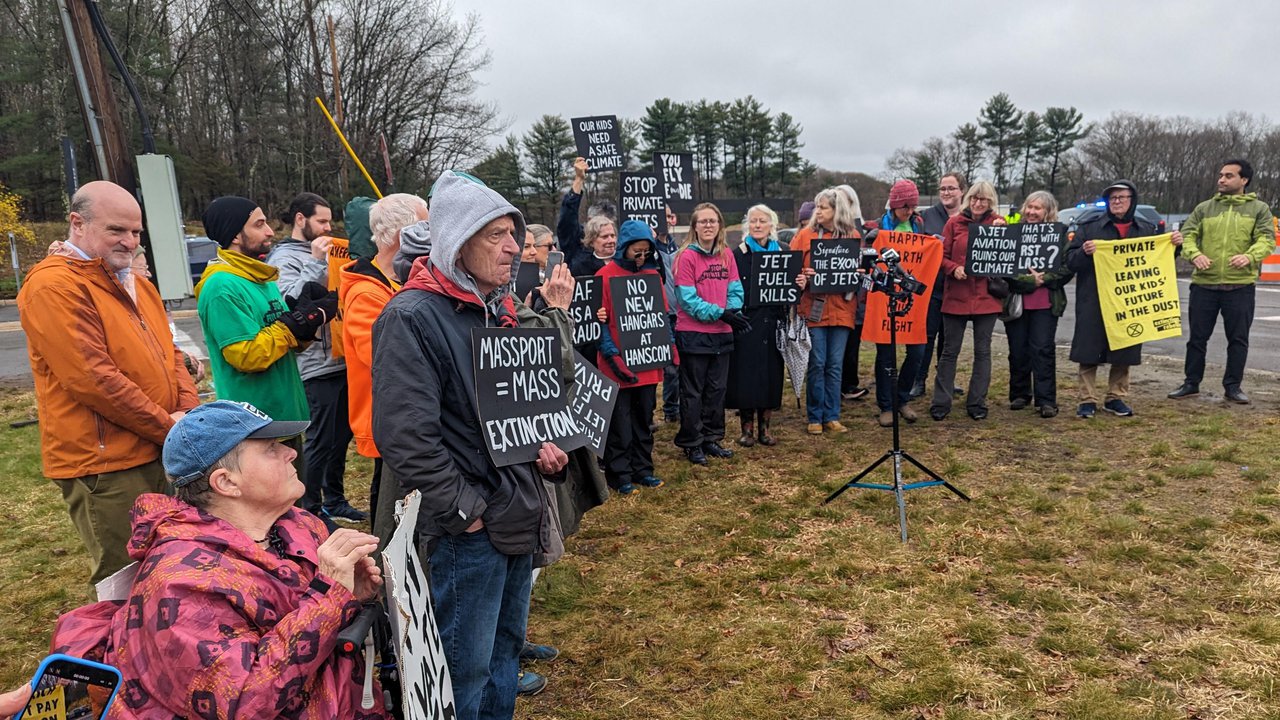
Deep Dive: Massachusetts Carbon Emissions Forced Up by Airport Expansion
In 2021, Governor Baker signed into law the Next-Generation Roadmap for Massachusetts Climate Policy, which sets net zero emissions limits for the Commonwealth. However, this plan does not include aviation emissions. In a generous interpretation, this was a grievous oversight. In a less generous view, it was intentional pandering to the ultra-wealthy and the aviation industry. Without accountability for aviation emissions, the Commonwealth can add new airports and expand existing ones. In response, airports in Massachusetts are rapidly expanding to accommodate private jets.
Why does airport expansion mean private jet expansion? Because private jets are exceedingly profitable and serve the rich. Private jet travel is approximately 10 times more energy-intensive per passenger than commercial flights and 50 times more energy-intensive than travel by train [1]. A four-hour flight in a private jet emits as much carbon as the average person does in an entire year [2].
Any kind of air travel only benefits the wealthy. While 1% of the global population produces more than half of the aviation emissions [3], 80% of the global population has never stepped foot on board any aircraft [4].
MassPort, the state authority that manages Logan, Hanscom and Worcester airports, is residing over two large private jet expansion projects. The first is Hanscom Airfield where MassPort wants to build 17 new hangars comprising 522,380 square feet of space on nearly 50 acres of land. This would add potentially 50-80 private luxury jets to the airfield. [5]
The result of Hanscom’s expansion will be an increase in greenhouse gas emissions of up to 161,348 metric tons per year. Those emissions are equivalent to driving more than 38,000 cars for a year, or burning 177.8 million pounds of coal, according to the EPA calculator. (6) (7) “Nothing could be more antagonistic to the Commonwealth’s climate goals and accepting without proper diligence a proposal that threatens to set us back immeasurably from our pursuit of greenhouse gas reduction objectives,” stated State Representative Simon Cataldo of Concord. [8] In June, Massachusetts Energy and Environmental Affairs Secretary Rebecca Tepper rejected the draft environmental impact report for the Hansom expansion, which places the project on hold until developers submit a supplemental DEIR report.
Lesser known is Massport’s Worcester airport expansion. Worcester Airport Director Andrew Davis stated "We have 1,300 acres of property on the airport. A great swath of it is developable and ready for more hangars, more corporate hangars, more maintenance repair facilities and just more general aviation support." (9)
Your tax dollars are helping Worcester airport realize its ambitions through the federal Airport Improvement Program (AIP). In 2024, there is $3.3 billion available to airports nationally. For fiscal year 2023, “climate leader” Senator Edward Markey wrote a press release celebrating how successful he, Senator Elizabeth Warren, and Congressman Bill Keating were in securing millions of dollars for Massachusetts airports. This included $8,491,177 for Worcester. In August 2024, Worcester received an additional $3,236,283 of AIP funding. [10]
The Cape and the Islands are a playground for the wealthy. So, it should be no surprise that private jet and commercial service to the Cape Gateway airport in Hyannis is growing quickly. The Boston Globe reported on June 25, 2024 that there is a $25 million plan to extend one of the airport’s runways by 900 feet to allow larger jets to use Gateway. This project is currently under environmental review.
For smaller airports wanting to accommodate larger private jets, making runways longer is a popular solution. For example, the $7.6 million airport expansion in Plymouth will enlarge runways to 5,000+ feet to attract more private jets (11). Expanding capacity is another strategy. There is a current proposal for Nantucket Memorial Airport to add a $40 million ramp expansion (12). Lawrence and Beverly airports are also adding hangars for private jets.

Even before expansion begins, residents who live near these airports are concerned. “What is happening?” asks Lisa Lantagne of TakeBackOurPlymouthAirport. The jets are “ruining our homes, our property values, our health, and our peace and quiet. We had a party on Saturday and had to stop talking because of the planes going by.” In an August 2023 article, the Globe reported that noise from Cape Cod Gateway is already a problem.
Environmental issues also play into regional airport expansion. In both Plymouth and Chatham, there are concerns about groundwater. Both airports sit on aquifers that provide drinking water to nearby towns. For Plymouth, Congressman Bill Keating stated in an email received by TakeBackOurPlymouthAirport, "(The aquifer at the airport) is a critical water resource for residential, commercial, and agricultural uses in the area, and provides drinking water to over 200,000 people in the towns of Plymouth and Carver.” (13) Meanwhile, Chatham is removing a substantial amount of trees on a 60 acre parcel over the aquifer to facilitate private jet traffic. These trees filter the water coming into the aquifer ensuring optimal quality. To protect the aquifers, perhaps both these airports should close?
Today’s climate crisis demands that we stop using fossil fuels and yet private jet expansion is driving up emissions. Massachusetts has criminally neglected the state’s climate goals. While other sectors strive to reduce the production of CO2, the expansion of private jets negates any progress the rest of us have tried to make. In addition, expansion threatens aquifers and negatively impacts residents to benefit the wealthiest 1%. It is time to fight back. Take action today. You can get involved with one of the organizations below, or feel free to reach out to XR Boston at XRBoston.Media@gmail.com if you have questions.
External resources to get involved in the fight against private jet expansion!
Community Land and Water Coalition (Plymouth Airport)
Featured:
-
The third annual Week of Rebellion is full of opportunities for celebration and action!
-
Our government had the opportunity to finally turn our state into a "climate leader," and they decided yet again to prioritize profits and political posturing over the well-being of residents.
-
Prominent climate scientists and activists demand immediate climate action in the United States.
-
Stop the Fossil Fuel Industry, Now: List of events for Extinction Rebellion Boston's September week of rebellion
-
A compilation of books, movies, articles, and ways to take action to protect Black lives
-
Nadia Colburn, PhD and member of Extinction Rebellion Media team, discusses how to talk about the climate and ecological crisis with family and friends.
Upcoming Events:
-
Sun Jul 20th @ 4 p.m.
-
Fri Jul 25th @ 6 p.m.
-
Sun Jul 27th @ 1 p.m.